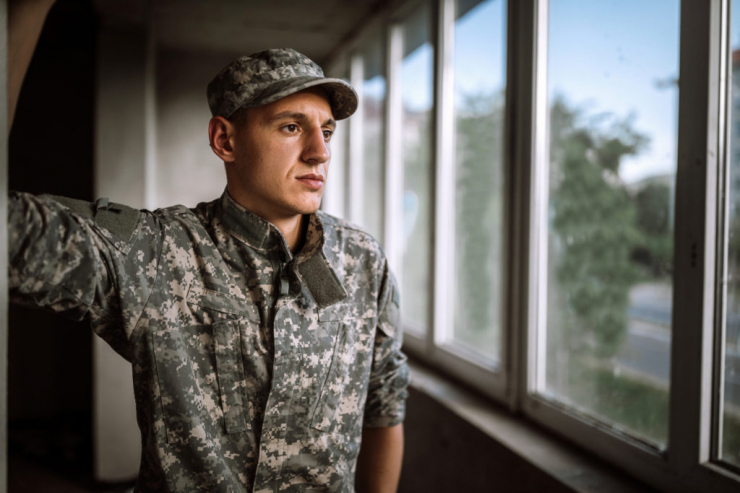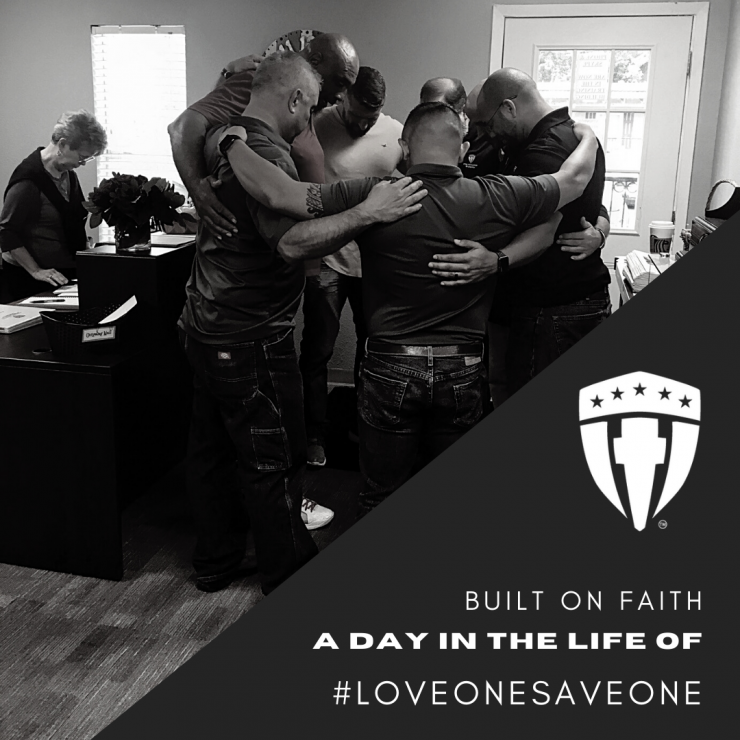
You’ll hear statistics thrown around about Veteran suicide with an air of detachment that belies the trauma and tragedy attached to the families left behind with nothing but questions – from 16 suicides a day to 22 and now perhaps as many as 44 (according to a joint study released by the America’s Warrior Partnership (AWP), Duke University and the University of Alabama).

In the past decade alone, 80,000 Veterans were lost to suicide—20,000 more than the number of American soldiers killed in action in Vietnam.
Each of those numbers represents a former service member who didn’t have to become a statistic. It can be daunting to see it and think, “Yeah, but what can we do?” Where do you even begin?
In Houston, Texas, it started with boots on the ground.

In 2009, a businessman started an organization that began as Impact Houston 21 but realized he wasn’t very good at raising funds. All he knew was that they needed something to get Veterans off the streets.

Over time, that thought kept getting bigger, and a path forward began to appear. The vision was to create a house that would provide safe and adequate shelter at its most basic function. But they also wanted to provide opportunities to hear Veteran stories, meet them, and try to help.

The first house was an 8-bedroom home that provided interim and traditional housing to Veterans working to heal their invisible wounds. Today, it’s a five-acre campus that now includes five housing facilities with 82 beds; two buildings for classes and worship services; a meeting facility to hold Warrior Group meetings, Alcoholics Anonymous and Narcotics Anonymous meetings; and a unit for hosting family integration programs. They call it Camp Hope.

“Our commitment is that we won’t be the last no for a Veteran trying to get help,” said David Maulsby, Executive Director of the PTSD Foundation of America.

Their DNA is in peer-to-peer outreach, one Veteran helping another. But now, they have more counselors on staff to help facilitate treatment and support. The primary focus is combat-related post-traumatic stress disorder (PTSD), which they note includes government contractors, like translators. They also offer support groups for first responders.
It all centers around a vision to drastically reduce the Veteran suicide rate.
“The Veteran's Administration (VA) reports that we are losing 20.6 Veterans every day to suicide. We believe the actual daily suicide rate is much higher than what is being reported,” said David.

“Only one-third of American Veterans seek health care from the VA. If a Veteran is not involved in a VA program, then the VA would not have a way to account for that Veteran in the overall total statistics.
“Furthermore, that number does not consider the many Veterans who die each day from alcohol and drug-related incidents that were fueled by an attempt to self-medicate the symptoms of post-traumatic stress disorder (PTSD),” he continued.

Here’s how it works. Typically, a Veteran learns about Camp Hope through word of mouth from other Vets or military members. The long-term program lasts anywhere from 6, 9, or 12 months and is offered at no cost to the Veteran. It includes a two-month transitional program.
Residents attend group lessons and support sessions with other combat Veterans, plus individual mentoring with certified combat trauma mentors.

Participants are also able to go on off-site small group interaction activities trips, such as camping, fishing, sporting events, and more.
Over the past ten years, more than 16,000 combat Veterans from all branches of the military and their families have found help, healing, and hope through their outreach program and at Camp Hope.

It’s 16,000 that might not otherwise have been helped. And one of those 16,000 is a Veteran named Alex.
Alex joined the Army and deployed to Italy, where he met his now-wife. After his time in service, Alex came home with combat-related trauma, eventually leaving the Army and starting a small business.
Unfortunately, his untreated PTSD caught up with him, and Alex began self-medicating, eventually losing his business and other things that directly impacted his life.
At her breaking point, his wife told him about Camp Hope, urging him to go to Houston and enter the program. Alex refused. Eventually, in total desperation, his wife moved to Houston to be closer to Camp Hope in hopes that he would follow her.

But Alex wasn’t ready.
Instead, he set up a suicide-by-cop situation. Following a psychotic episode, Alex woke up in his vehicle with a firearm in his lap and 10 others pointed at him by law enforcement. He went to jail for three months, but his wife begged the judge and District Attorney to spare him additional prison time if he entered the program at Camp Hope.

They agreed, and not long after, Alex was in Houston. Reluctantly, he worked through the program, eventually willingly participating in his treatment, and successfully graduated. He became a driver for Camp Hope at $8/hour, helping to transport Vets to doctor appointments or other essential meetings, and then worked his way up through the organization. Now, Alex is the Director of Programming at Camp Hope and resides in Houston with his wife and family.
It’s a pretty incredible story and a testament to their critical work supporting Veterans and their families. Recently, they even had a Vietnam Veteran graduate the program, a remarkable fact considering the decades of trauma he lived with and worked through.

In addition to their warrior groups – a critical component of post-program care – they also diligently work to help families as their loved one is transitioning out of the program, ensuring they have the tools and resources they need to support each other.
And it works, it really works. The proof is in the statistics.
“Over the past ten years, more than 1,650 combat Veterans have found a renewed purpose and have since earned college degrees, found employment, become financially independent, reunified with their families, and reintegrated into society,” David shared.

Perhaps one day, programs like Camp Hope won’t need to exist. But until then, thank goodness it does.
As a proud supporter of Veterans and military members, Chive Charities wanted to find a way to support Camp Hope. Thanks to our donors, a community committed to serving those who’ve served, we contributed $10,000 to help support the Camp Hope residential program and the cost of clinical therapy sessions.
“This gift provides an immediate impact on Veterans’ journey to post-traumatic growth,” said David.

When we asked if there was anything else we could do to support them, David smiled and said, “Not everyone can stroke a check, but everyone can share a Facebook post or like a YouTube video. We would love to extend our reach and impact more lives.”
That’s especially true this month, as June is PTSD Awareness Month, a nationally-recognized way to raise awareness for post-traumatic stress and its impact on real lives.

The impact of post-traumatic stress can feel immense. But thanks to organizations like the PTSD Foundation of America and Chive Charities, we’re doing all we can to support the heroes. We can't adequately express our gratitude to all of the donors who support our mission to serve Veterans, active-duty service members, and military families.
But like the PTSD Foundation of America, we’re committed to doing whatever it takes to avoid being the last no for a Veteran trying to get help. To date, we’ve said yes to 160 of them, totaling nearly $4.4M in aid. With your support, it can be even more. Thank you for being part of the life-changing impact. DONATE HERE.

If you or someone you know is a Veteran battling post-traumatic stress, call the combat trauma helpline at 877-717-PTSD (7873) for 24-hour support.































































-3__small.jpg)












































































































__small.jpg)










__small.jpg)






















































































_with_flag,_jason__emily_rowley-4__small.jpg)

































































































































-2__small.jpg)


























































































































































